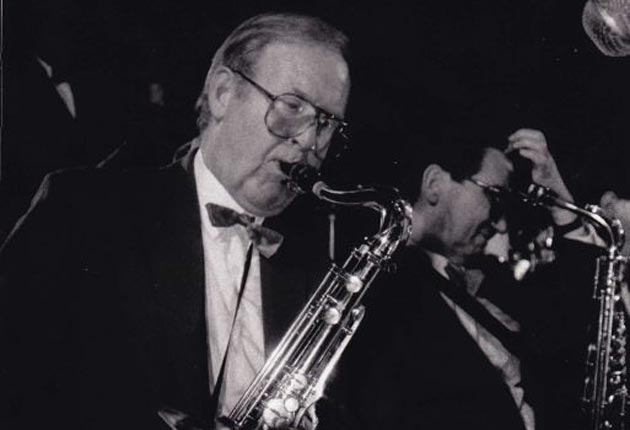Eddie Mordue: Tenor saxophonist who played in big bands, in sessions and on television

Your support helps us to tell the story
From reproductive rights to climate change to Big Tech, The Independent is on the ground when the story is developing. Whether it's investigating the financials of Elon Musk's pro-Trump PAC or producing our latest documentary, 'The A Word', which shines a light on the American women fighting for reproductive rights, we know how important it is to parse out the facts from the messaging.
At such a critical moment in US history, we need reporters on the ground. Your donation allows us to keep sending journalists to speak to both sides of the story.
The Independent is trusted by Americans across the entire political spectrum. And unlike many other quality news outlets, we choose not to lock Americans out of our reporting and analysis with paywalls. We believe quality journalism should be available to everyone, paid for by those who can afford it.
Your support makes all the difference.Emerging from the heyday of the British big bands as one of its most admired instrumentalists, Eddie Mordue went on to become a highly successful session player, at home in every musical genre.
He played concerts until as recently as January; his energy and drive saw him tour the globe, make thousands of recordings and entertain generations of audiences on television and radio shows the world over.
Born in South Shields in January 1928, he was given a saxophone by his father, an amateur musician. Mordue came to London aged 13 in 1941 and joined his first touring ensemble, Archie's Juvenile Band. During the Second World War he perfected his style and technique and played with various other big bands, on occasion appearing on the same bills as the Glenn Miller band.
Producing a distinctive sound on the tenor saxophone while withthe Eric Winstone Band, he caught the attention of the lead female singer Julie Dawn. Marrying after thewar, the couple went on to recordand perform with the likes ofGene Kelly, Sammy Davis, Jr and Frank Sinatra.
Sinatra took a shine to Juliewhile rehearsing one day and, noticing that she was with Eddie, sizedhim up during a break. Confronting Mordue in the lavatory, Sinatrajust looked at him and said "Julie Dawn?" Not put off by a man who normally got his own way Mordue said, "She's with me". The matter never went any further.
Joining the Jack Nathan Bandin 1951, a regular at the London Palladium and the emerging West End jazz scene, Mordue soon went freelance, loaning his silky style to the benefit of Nat King Cole and Billie Holiday'slast concert. While performing atthe Palladium, he told of how one night Judy Garland sat on the edgeof the stage, dangled her legs overthe orchestra pit, and wrappedthem around his shoulders while singing "Somewhere over the Rainbow". He later said that he felt her energy like "electricity" running through him.
With London in the colourful grip of the swinging Sixties, more and more recordings followed, including tracks with Shirley Bassey, Dusty Springfield, and Alexis Korner. With considerable chutzpah, he once grabbed Princess Margaret during a royal function as nobody was dancing with her. After a couple of circuits he calmly rejoined the band, to the gasps of stunned onlookers.
Balancing an increasing workload, he remarried in 1967 to a German au pair, Gudrun, and raised three sons with her. During the 1970s he played with orchestras and bands working on the cream of British television shows including Morecambe and Wise, The Generation Game, Top of the Pops, The Two Ronnies and Roy Castle's Record Breakers, where he played the world's smallest saxophone, the sopranino sax
He also found time to recordwith the Bee Gees and Mike Batt'sThe Wombles – he once "sweated ike a pig", he said, performing in a full size costume as Orinoco playing the tenor sax.
Mordue's sight-reading ability and timing brought him work on an increasing number of film soundtracks, including The Pink Panther with Henry Mancini and theJames Bond films with John Barry, which saw him tour Japan whilepromoting You Only Live Twice. Recording for Paul McCartney on his solo album Give My Regards To Broad Street, he was asked by Sir Paul,"Can you play that part again only an octave higher?"
He did so immediately. McCartney seemed impressed. Mordue always said he didn't have the heart to tell him he only needed to press one key down to do it. But McCartney probably knew that all along.
Performing in theatres and concerts halls on tour in Europe and Asia with Glenn Miller and Ted Heath tribute big bands, Mordue's love for music never abated and his jazz roots were always close to his heart.
He was rarely unwell, and on what turned out to be his final journey in the ambulance to hospital his sense of humour didn't fail him. He was asked, "Are you allergic to anything?"
He replied, "Yes – rock'n'roll." They were his last words.
Edwin Mordue, saxophonist: born South Shields 5 January 1928; married firstly Julia Dawn, secondly Gudrun (three sons); died 26 January 2011.
Join our commenting forum
Join thought-provoking conversations, follow other Independent readers and see their replies
Comments